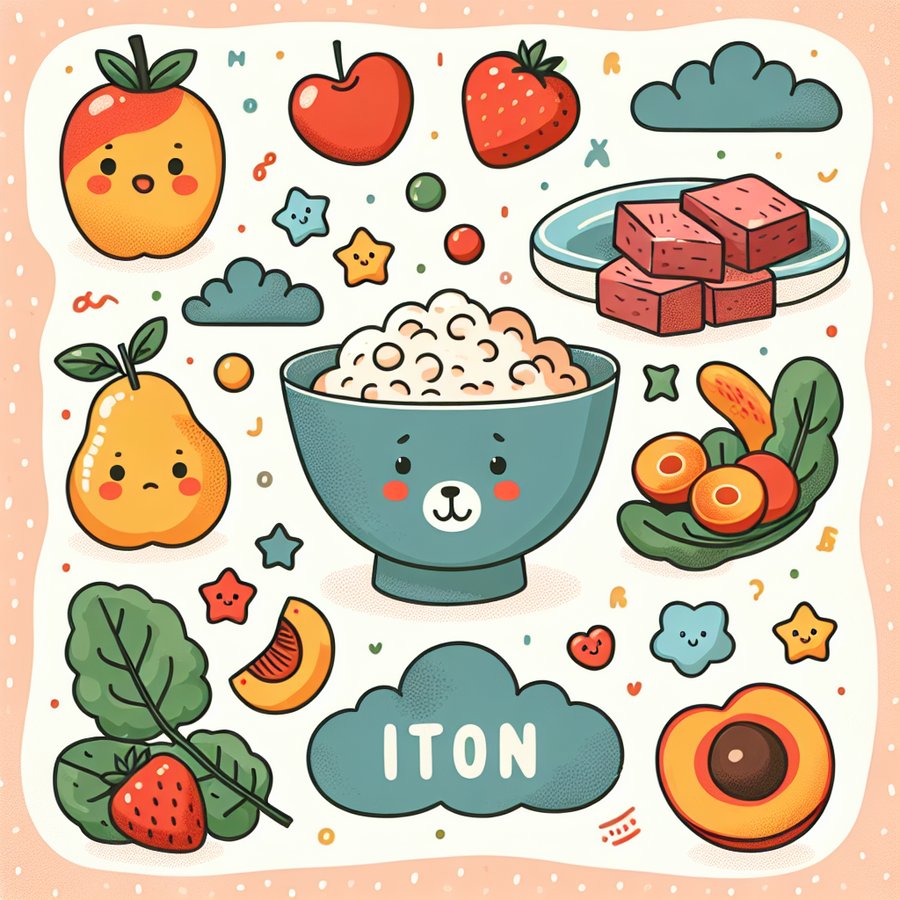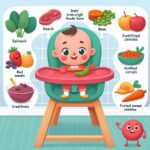Iron-Rich Foods for 9-Months-Old Anemic Infants are critical for their growth and development. Anemia in infants, primarily caused by iron deficiency, can significantly impact a baby’s overall health, leading to developmental delays and increased susceptibility to infections. This guide aims to provide parents and caregivers with comprehensive insights into incorporating iron-rich foods into their 9-month-old infants’ diets.
Understanding Iron Deficiency in Infants
Iron is a vital mineral that plays a crucial role in the formation of hemoglobin, a protein in red blood cells responsible for carrying oxygen throughout the body. For infants, especially those around 9 months old, iron is indispensable for proper brain development and function. According to research, iron deficiency is the most common nutritional deficiency in infants and can lead to anemia if not addressed.
Anemia in infants can manifest through various symptoms such as fatigue, pale skin, irritability, and slow cognitive and physical development. Identifying iron deficiency early and incorporating iron-rich foods into your child’s diet can prevent these adverse effects. This is where understanding the best iron-rich foods for 9-months-old anemic infants becomes crucial.
Top Iron-Rich Foods for 9-Months-Old Anemic Infants
Introducing solid foods to your infant’s diet opens up a world of opportunities to include various iron-rich options. Here are some top picks that are both nutritious and baby-friendly:
- Puréed meats like beef, chicken, and turkey – rich sources of heme iron, which is easily absorbed by the body.
- Cooked and mashed lentils or beans – packed with non-heme iron, which, while not as readily absorbed as heme iron, is still beneficial, especially when paired with vitamin C-rich foods.
- Iron-fortified cereals and oatmeals – a convenient and effective way to boost your baby’s iron intake.
- Dark green leafy vegetables such as spinach and kale – these should be cooked, puréed, and possibly mixed with other foods to enhance their acceptability to infants.
- Prune juice – in moderation, can help both with iron intake and keeping your infant’s digestive system running smoothly.
When introducing these iron-rich foods, it’s essential to consider the overall balance of nutrients in your baby’s diet. For more detailed guidance, our comprehensive article on dietary recommendations for anemic infants provides in-depth information.
Enhancing Iron Absorption in Your Infant’s Diet
Incorporating iron-rich foods into your baby’s diet is step one. Maximizing the absorption of that iron is step two. Vitamin C is a potent enhancer of iron absorption, especially for non-heme iron found in plant-based foods. Therefore, combining iron-rich foods with vitamin C-rich foods can significantly benefit your baby’s iron levels. Examples include serving pureed spinach with orange slices or adding tomato sauce to pureed meats.
Another tip for increasing iron absorption is to avoid giving your baby calcium-rich foods and drinks with iron-rich meals, as calcium can inhibit iron absorption. Planning meals that separate high-iron foods from high-calcium foods ensures that your baby gets the most out of the nutrients you’re providing. For personalized advice, consulting with a pediatric nutritionist can help tailor dietary plans to meet your infant’s needs.
Practical Tips for Introducing Iron-Rich Foods
Introducing new foods to your baby’s diet can be a delightful yet challenging experience. To make the transition smoother, consider the following tips:
- Start with small quantities and gradually increase the portion size as your baby becomes accustomed to the new foods.
- Mix iron-rich foods with familiar favorites to encourage acceptance.
- Use baby-friendly preparation methods, such as pureeing or mashing, to ensure the food is easy for your baby to eat.
- Be patient and persistent. It may take several attempts for your baby to accept a new food.
For more ideas on preparing and introducing iron-rich foods to your infant, check out our articles on iron-rich vegetarian recipes and introducing solid foods to babies with allergies.
Conclusion
Iron is a critical nutrient for infants, especially for those diagnosed with anemia. By incorporating a variety of iron-rich foods into your 9-month-old’s diet and employing strategies to enhance iron absorption, you can support your baby’s growth and development effectively. Remember, every baby is unique, so it’s essential to adjust dietary choices based on your infant’s preferences and nutritional needs. For further guidance, don’t hesitate to reach out to healthcare professionals specialized in pediatric nutrition.
Empower your baby’s health journey with the right nutritional choices, starting with iron-rich foods for 9-months-old anemic infants. Your efforts today will lay the foundation for a healthy tomorrow.













